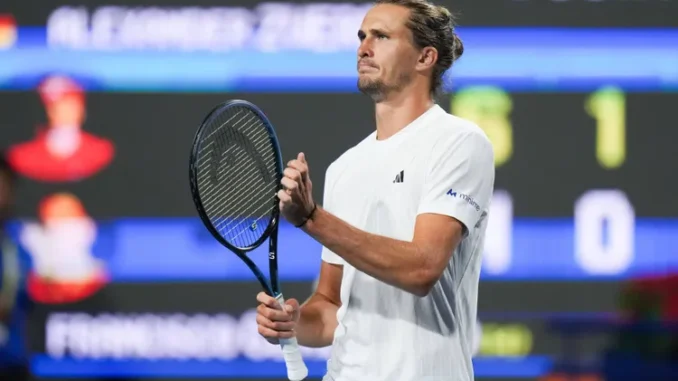
In the unforgiving arena of professional tennis, where mental fortitude is as critical as physical prowess, Alexander Zverev has long been a towering figure. The world No. 3, with 24 ATP titles and an Olympic gold medal, has faced a turbulent 2025, marked by a devastating first-round exit at Wimbledon—the earliest Grand Slam loss of his career since 2019. The defeat to Frenchman Arthur Rinderknech, a grueling five-setter, left Zverev raw and vulnerable, admitting to a profound sense of loneliness that has haunted him both on and off the court. “I’ve never felt this empty before. Just lacking joy, just lacking joy in everything that I do,” he confessed, sparking concern across the tennis world. Now, his coach, Toni Nadal, has passionately defended the German star, dismissing criticism as “complete nonsense” and shedding light on the hidden battles Zverev faces as he aims to reclaim his spark at the Canadian Open in Toronto.
Zverev’s Wimbledon loss was a seismic shock, part of a chaotic first round that saw four top-10 players tumble. The 28-year-old, who reached the Australian Open final in January, fell 7-6(3), 6-7(8), 6-3, 6-7(5), 6-4 to Rinderknech, despite holding a 40/0 lead in a pivotal fifth-set game. “I think Arthur deserved to win today,” Zverev said, his candor revealing a player wrestling with more than just missed shots. “It’s not necessarily about tennis. Just lacking joy outside of tennis, as well.” His admission of feeling “very, very alone and very lonely” stirred emotions, with tennis legend Boris Becker revealing he “cried” watching Zverev’s press conference. The German’s struggles, compounded by a season of ups and downs—39-14 with a title in Munich but a six-match skid post-Australia—prompted speculation about his mental state and team dynamics.
Toni Nadal, the renowned coach and uncle of Rafael Nadal, who began working with Zverev after Wimbledon, swiftly countered the narrative that his player is faltering. “That’s complete nonsense,” Nadal declared, addressing claims that Zverev’s mental struggles signal a decline. He pointed to the unseen pressures of a grueling tour schedule and personal challenges, including Zverev’s role as a father to daughter Mayla. “Sascha is a fighter, but he’s human. The weight of expectations, the travel, the isolation—it’s a lot,” Nadal said. Their 10-day training stint at Rafa’s Mallorca academy, where Zverev trained late into the night and dined with the Nadals, was a turning point. “We spent hours talking about tennis, about life,” Zverev recalled. “Rafa gave me great insight of what it’s like to play against me. It was very helpful.”
Zverev’s candidness about needing a mental coach—“Maybe for the first time in my life I’ll probably need it”—underscored his willingness to confront his struggles. Nadal, known for maximizing players’ potential, is focused on reigniting Zverev’s passion. “He has a personality that can give you a lot of confidence,” Zverev said of Toni. “If he can maximize what I have, I’m sure I can have a lot more success.” This partnership comes at a critical juncture, with Zverev’s 500th career win at the Canadian Open against Matteo Arnaldi marking a milestone as the first player born in the 1990s to reach that mark. “I consider it a very important milestone,” he said, though his focus remains on bigger prizes, like a first Grand Slam title.
Off the court, Zverev’s challenges have been compounded by past controversies, including domestic abuse allegations from former partners Olga Sharypova and Brenda Patea, which he has consistently denied. A 2024 Berlin court case was settled out of court, with Zverev paying €200,000, though his legal team stressed this was “solely to shorten the proceedings” and not an admission of guilt. The ATP’s 15-month investigation in 2023 found “insufficient evidence” to discipline him, yet the scrutiny lingers, adding to the isolation he described. “Tennis is a business, which, unfortunately, is not always the nicest thing in the world,” Zverev noted in a past interview, reflecting on the sport’s solitary nature.
As Zverev competes in Toronto, where he’s the top seed and a 2017 champion, his semifinal run—highlighted by a 6-7(8), 6-4, 6-3 comeback against Alexei Popyrin—signals a resurgence. “I want to be remembered for my tennis,” he said, a mantra driving his focus. With Toni Nadal’s guidance and a renewed sense of purpose, Zverev is poised to channel his hidden battles into on-court triumphs, eyeing the US Open as a chance to silence doubters and rediscover his joy.
Leave a Reply